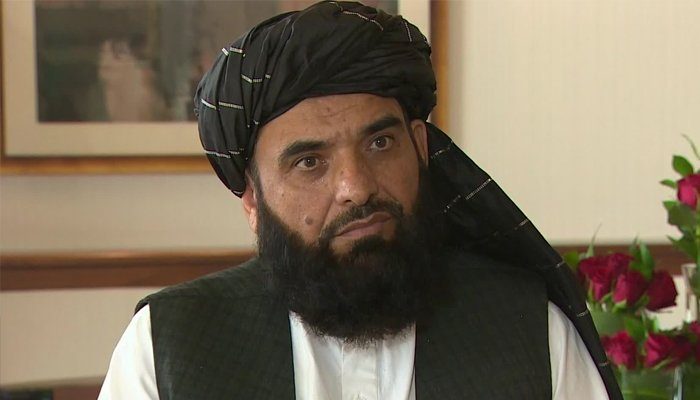G7 leaders are expected to meet on Tuesday in an “urgent” meeting to discuss whether or not to officially recognise or sanction the Taliban.
The Taliban has warned of consequences if the United States extends its troop withdrawal past the 31 August deadline, a spokesperson said on Monday, as G7 leaders prepared for an “urgent” meeting.
“If the US or UK were to seek additional time to continue evacuations, the answer is no. Or there would be consequences. It will create mistrust between us. If they are intent on continuing the occupation it will provoke a reaction,” Suhail Shaheen told Sky News on Monday.
The comments came after US President Joe Biden told the White House on Sunday that there are discussions regarding the extension of the military drawdown in Afghanistan beyond the end of this month.
“We have seen the public statements by the Taliban spokesman about their views on 31 August, I think we all understand that view,” said US Department of Defence press secretary John Kirby following Shaheen’s statement.
Escalations in Afghanistan have rapidly unravelled in recent weeks, leaving much of the world in shock. Biden’s announcement to withdraw all US and NATO troops from the country after two decades of war without a proper peace plan has drawn criticism from the international community.
Now, Biden is under global pressure to ensure the fast and safe evacuation of foreigners as well as those who worked with the west.
In recent weeks, Qatar has taken the lead in carrying out what Biden describes as “the largest airlift of people in history”, rushing to evacuate Afghans and foreigners from Kabul.
The Gulf state has already evacuated thousands of people from Afghanistan with the number expected to increase over the next few days and weeks.
In an interview with the American media, Qatar’s Foreign Minister Sheikh Mohammed bin Abdulrahman bin Jassim Al Thani said evacuations are expected to take place for another week or two, noting that his country has taken “full responsibility” in the evacuation process.
Meanwhile, the official also held a phone call with his German counterpart Heiko Maas on Monday, in which the two discussed the status of the evacuation process.
Received a call from my colleague @HeikoMaas and discussed the latest evacuation updates in #Afghanistan, along with the need for cementing international efforts to achieve a peaceful transition, protect civilians and preserve the rights of all #Afghan people.
— محمد بن عبدالرحمن (@MBA_AlThani_) August 23, 2021
“Received a call from my colleague Heiko Maas and discussed the latest evacuation updates in Afghanistan, along with the need for cementing international efforts to achieve a peaceful transition, protect civilians and preserve the rights of all Afghan people,” said Sheikh Mohammed in a tweet.
‘Urgent’ G7 meeting
Meanwhile, members of the G7 – the US, Britain, Italy, France, Germany, Canada, and Japan – are due to hold an “urgent” virtual meeting on Tuesday to discuss whether or not to officially recognise or sanction the Taliban.
“The G7 leaders will agree to coordinate on if or when to recognise the Taliban,” said one European diplomat, noting a renewal of sanctions on the militants to push them to adhere to their pledges over respecting women’s rights and international relations remains an option.
Discussions over extending the deadline of the troop withdrawal is also on the G7’s agenda. NATO Secretary General Jen Stoltenberg and UN Secretary General Antonio Guterres are both expected to attend.
“We want to start the process of developing a clear plan, so that we can all deal with the new Afghan regime in a unified and concerted way,” said Karen Pierce, Britain’s envoy to the US.
“We will judge the new regime by actions, not words,” she added.
Germany’s foreign minister meanwhile said his country will be pushing its fellow members to provide additional funds for humanitarian aid.
“I believe the G7 countries should live up to their responsibilities and find a response to mitigate the acute humanitarian hardship that’s already prevalent in the region and that will increase over the coming weeks,” said Maas.
The Taliban seized power on 15 August after entering Kabul, forcing former president Ashraf Ghani to escape to Tajikistan before moving on to the United Arab Emirates.
Since then, the future governance of the country has remained uncertain, with Afghans in the country weary over a future under Taliban rule.
On Monday, Taliban member Khalil al-Rahman Haqqani said that discussions with members of the former Afghan government are underway to form an “inclusive government” with political and military parties.
“We [want to] bring together all the political and military parties and unite them to work together to build a better Afghanistan and defend it,” Haqqani said.
Worsening humanitarian situation
The UN has estimated that at least 400,000 people in Afghanistan have been forced to flee their homes since the beginning of 2021, with the number expected to rise due to the latest political instability.
“2021 is an extraordinarily difficult year for Afghanistan,” WFP representative and country director Mary-Ellen McGroarty told AFP on Friday in a telephone interview from Kabul.
Currently, the country is facing its second severe drought in three years, putting some two million children at risk of malnutrition.
Follow Doha News on Twitter, Instagram, Facebook and Youtube







